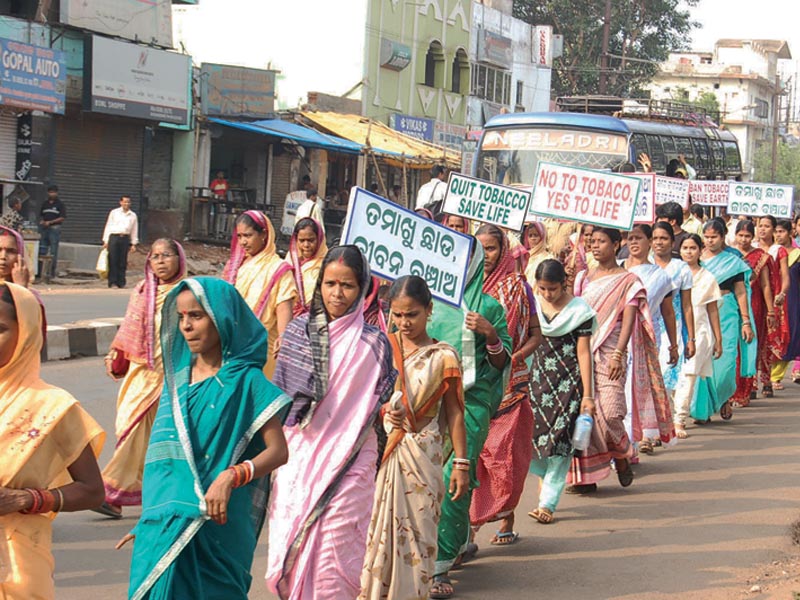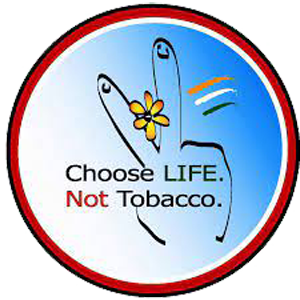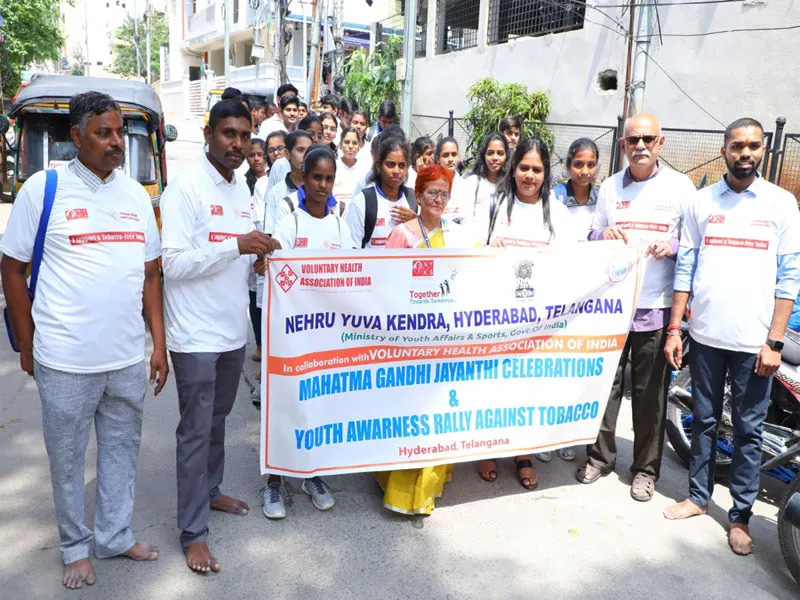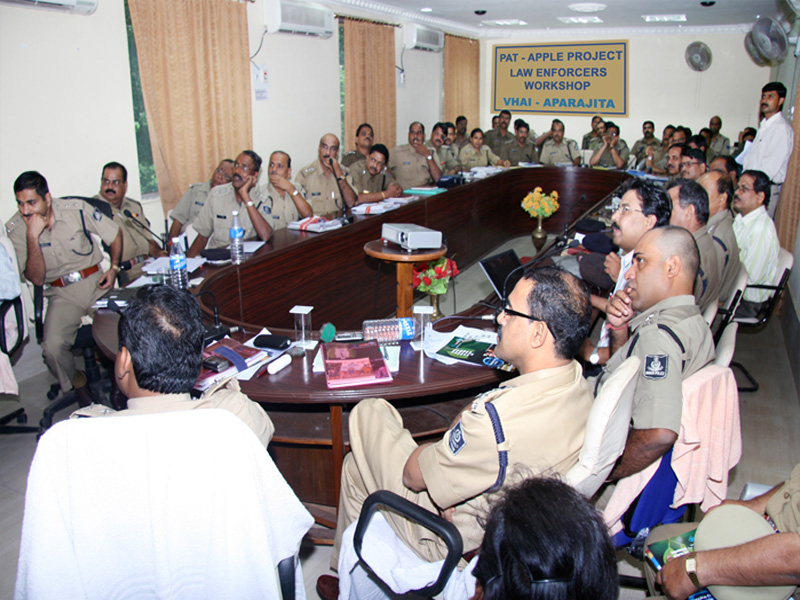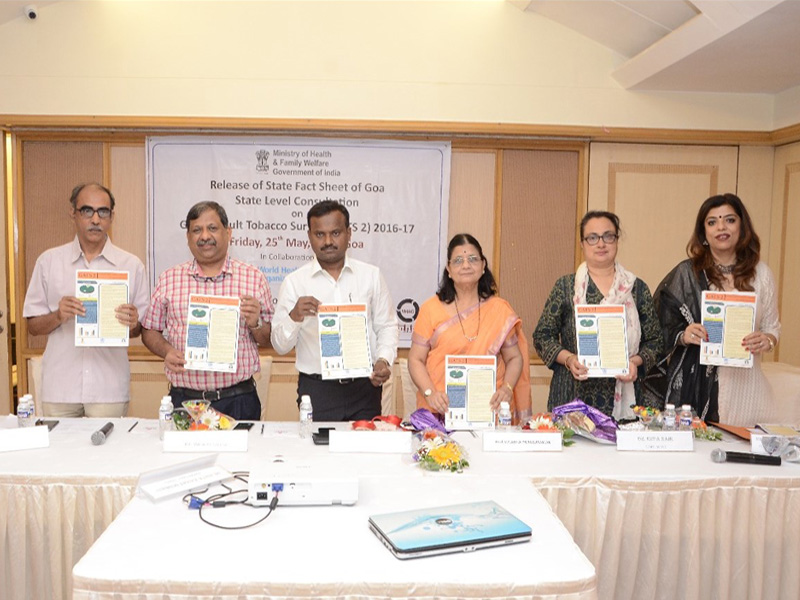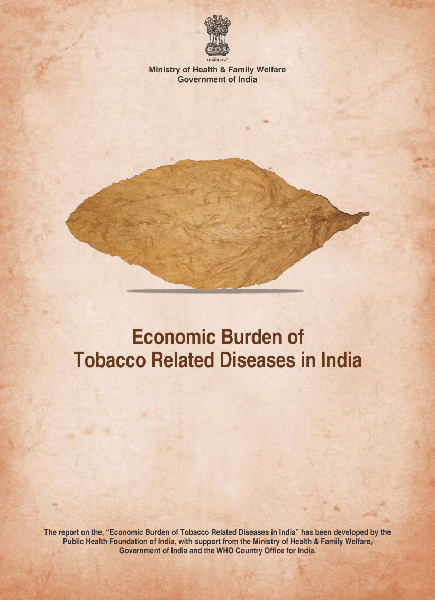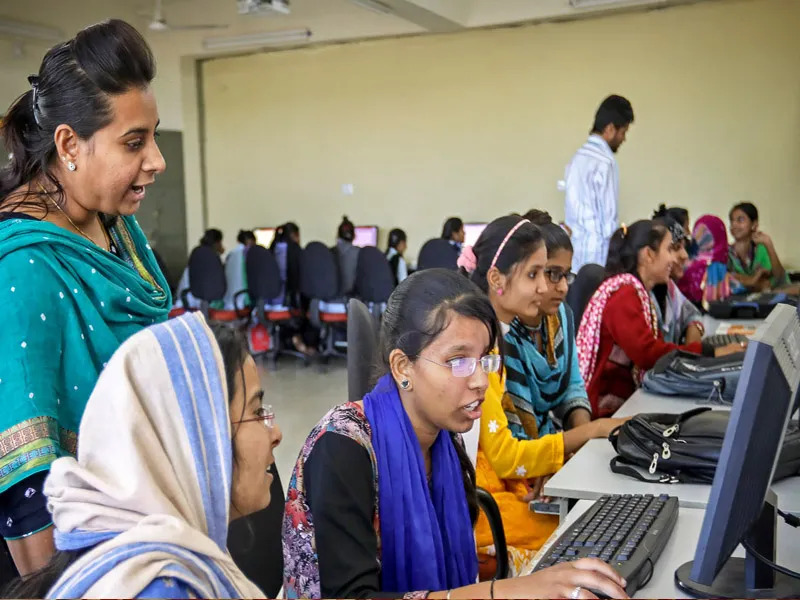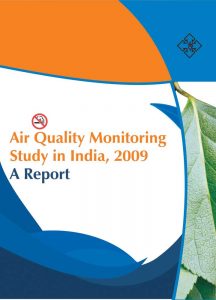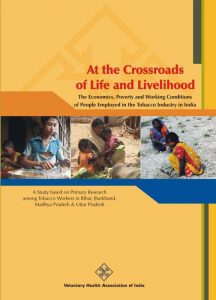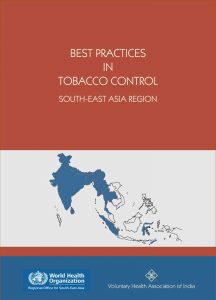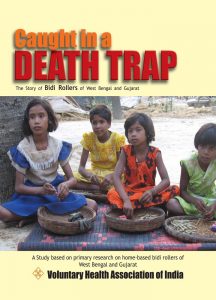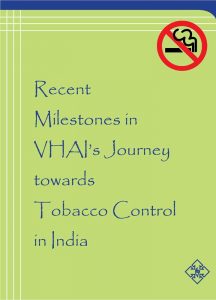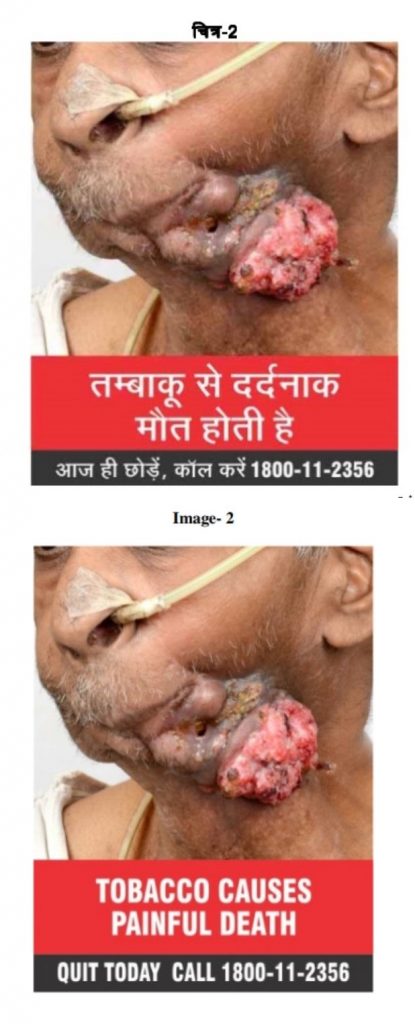




Overview
Tobacco use is responsible for 13.5 lakh deaths, 1.5 lakh cancers, 4.2 million heart diseases and about 3.7 million lung diseases every year in India. India is the oral cancer capital of the world because of rampant habit of tobacco chewing. About 50% of all cancers in India are contributed to tobacco use. Tobacco consumption among youth also has alarming figures. As per Global Youth Tobacco Survey (GYTS 4), conducted among 80,772 students aged 13-15 years, revealed that 9.6% boys and 7.4% girls are currently using tobacco. The median age at initiation of cigarette and bidi smoking, and smokeless tobacco use were found to be as low as 11.5 years, 10.5 years and 9.9 years respectively. India has reduced tobacco use among adults by 17% since 2010 attributed to effective measures by the National and State Governments.
To save the lives of millions of people, VHAI has been implementing a comprehensive tobacco control programme at the National and State level. The purpose of the programme is to strengthen tobacco control policies through strong policy initiative building & media partnerships and commitment at national and state level based on evidence and best practices. This niche mission has contributed significantly to the overall tobacco control measures in the last decade. VHAI has run many successful campaigns that have received phenomenal appreciation.
The crucial attributes of VHAI tobacco control work have been building effective partnerships, sensitization of stakeholders, capacity building of state partners through coordinated efforts with civil society organizations.
Tobacco use is responsible for 1.5 lakh cancers, 4.2 million heart diseases, 3.7 million lung diseases every year in India. India is the oral cancer capital of the world due to rampant habit of tobacco chewing. Over 65% of cancer in India is contributed to tobacco related, breast and cervical cancer. 30% of cancers in head and neck region are caused due to chewable tobacco use in India. India has reduced tobacco use among adults by 17 per cent since 2010 due to strong steps taken by National and State Governments along with other key stakeholders.
To save the lives of millions of people, VHAI has been implementing a comprehensive tobacco control programme at the National and State level. The purpose of the programme is to strengthen tobacco control policies through strong policy initiative building, media partnerships and commitment at the national and state level based on evidence and best practices. This niche mission has contributed significantly to the overall tobacco control measures in the last decade. VHAI has run many successful campaigns that have received phenomenal appreciation.
The crucial attributes of VHAI’s tobacco control work are building effective partnerships, sensitization of stakeholders, capacity building of state partners and coordinated efforts with civil society organizations.
VHAI’s Role in Tobacco Control
With a vision of making health and development a reality for the people of India, VHAI has over 45 years of experience in innovative models of sustainable health care particularly at the grassroots level.
VHAI is amongst the pioneers of tobacco control at National, State and District level.
Assam, Andhra Pradesh, Himachal Pradesh, Kerala, Rajasthan, Madhya Pradesh, Odisha,
Meghalaya and Uttar Pradesh are some of the States, where VHAI has been at the forefront on tobacco control programs. Our focus is to safe-guard the public from second hand smoke; children and young adults from initiating tobacco use and gaining access to tobacco products.
Key Activities
1. Providing Technical Support to Government of India on Tobacco Control Initiatives
VHAI works very closely with Ministry of Health & Family Welfare on wide-ranging public health issues and with other key departments like Labour, Rural Department, Skill Development, Women and Child Development.
VHAI has been nominated as a Member of many Committees of the Government of India particularly meant for Tobacco Control,
including:
- Task Force on Tobacco Control, Working Group on Disease Burden (Communicable and Non-Communicable Diseases) for the formulation of the 12th Five Year Plan
- Committee to Review COTPA and suggest appropriate amendments
- Task Group on Tobacco Prevention and Control under Non-Communicable Diseases Working Group
- Technical Advisory and Monitoring Committee regarding 2nd and 3rd Round of Global Adult Tobacco Survey (GATS India 2 and 3)
- Technical Expert Committee for National Programme for Prevention and Control of Cancer, Diabetes, Cardiovascular Diseases and Stroke
- Expert Committee for Development of New Specified Health Warnings
- Nasha Mukti Abhiyan Task Force under National Health Policy 2017
- National Technical Working Group on School Health Curriculum under Ayushman Bharat
2. Partnerships for Creating Supportive Environment for Tobacco Control in States
VHAl provides key technical support for State and District Tobacco Control Cells, link them with the community, spread outreach of activities, increased awareness on the law and assisted state governments in enforcing legislative provisions. District level community-based organizations also came together as a stronger coalition to broad base the awareness generation activities across various States and Districts. VHAI has been identified as the technical partner for National Tobacco Control Programme (NTCP) in the States of Telangana, Uttar Pradesh and Chhattisgarh.
The organization’s niche work in building partnerships has contributed to overall tobacco control measures in the last decade. Additionally, VHAI has robust relationships with various Ministries, policy makers, doctors, public/private institutions, community organisations, academic bodies, other public health organizations and media.
In the year 2012, VHAI received WHO Regional Director’s Appreciation Award for Outstanding contribution to tobacco control.
3. Sensitizing Various Stakeholders
Sensitisation workshops and Awareness generation activities are conducted for the following:
- Frontline Workers like ASHAs, ANMs, Health workers and volunteers
- Education departments and Educational institutions
- District and Block administration
- Health Department., Practicing Doctors and Health Professionals
- Restaurant owners
- Other CSOs and partners
4. Release of State Fact Sheets on the findings of the Global Adult Tobacco Survey (GATS 2) report, Government of India
VHAI coordinated the release of Global Adult Tobacco Survey 2016-17 (GATS) conducted by Ministry of Health & Family Welfare.
This was released in 30 States/Union Territories of India with the help of respective state Governments. This widespread sub national dissemination of GATS data has resulted in a lot of attention to the issue both among policy makers and law enforcers in the respective States/Union Territories.
5. Release State Factsheets on Economic Burden of Tobacco Related Diseases in India, Government of India
VHAI coordinated the release of state factsheet on Economic Burden of Tobacco Related Diseases in India in 13 states. This was released at a consultation in the presence of key stakeholders from Health, Finance, Excise, Revenue, Civil society and Academia.
All the state focal points, including the State Tobacco Control Cells, were involved in this event.
6. ‘Skill Development Training’ Program for beedi workers
Ministry of Labour & Employment has initiated programme for rehabilitation of beedi workers to provide them alternative sources of livelihood which are economically viable.
VHAI provided sub-national ground level support to the project. VHAI through its outreach at the community level, building effective partnerships, sensitization of policymakers, capacity building of state partners, and coordinated efforts with other civil society organisations at national and state levels attributed to the success of the project
VHAI works very closely with Ministry of Health & Family Welfare on wide-ranging public health issues and with other key departments like Labour, Rural Department, Skill Development, Women and Child Development.
VHAI has been nominated as a Member of many Committees of the Government of India particularly meant for Tobacco Control, including:
- Task Force on Tobacco Control, Working Group on Disease Burden (Communicable and Non-Communicable Diseases) for the formulation of the 12th Five Year Plan
- Committee to Review COTPA and suggest appropriate amendments
- Task Group on Tobacco Prevention and Control under Non-Communicable Diseases Working Group
- Technical Advisory and Monitoring Committee regarding 2nd and 3rd Round of Global Adult Tobacco Survey (GATS India 2 and 3)
- Technical Expert Committee for National Programme for Prevention and Control of Cancer, Diabetes, Cardiovascular Diseases and Stroke
- Expert Committee for Development of New Specified Health Warnings
- Nasha Mukti Abhiyan Task Force under National Health Policy 2017
- National Technical Working Group on School Health Curriculum under Ayushman Bharat.
VHAl provides key technical support for State and District Tobacco Control Cells, link them with the community, spread outreach of activities, increased awareness on the law and assisted state governments in enforcing legislative provisions. District level community-based organizations also came together as a stronger coalition to broad base the awareness generation activities across various States and Districts. VHAI has been identified as the technical partner for National Tobacco Control Programme (NTCP) in the States of Telangana, Uttar Pradesh and Chhattisgarh.
The organization’s niche work in building partnerships has contributed to overall tobacco control measures in the last decade. Additionally, VHAI has robust relationships with various Ministries, policy makers, doctors, public/private institutions, community organisations, academic bodies, other public health organizations and media.
In the year 2012, VHAI received WHO Regional Director’s Appreciation Award for Outstanding contribution to tobacco control.
Sensitisation workshops and Awareness generation activities are conducted for the following:
- Frontline Workers like ASHAs, ANMs, Health workers and volunteers
- Education departments and Educational institutions
- District and Block administration
- Health Department., Practicing Doctors and Health Professionals
- Restaurant owners
- Other CSOs and partners
VHAI coordinated the release of Global Adult Tobacco Survey 2016-17 (GATS) conducted by Ministry of Health & Family Welfare. This was released in 30 States/Union Territories of India with the help of respective state Governments. This widespread sub national dissemination of GATS data has resulted in a lot of attention to the issue both among policy makers and law enforcers in the respective States/Union Territories.
VHAI coordinated the release of state factsheet on Economic Burden of Tobacco Related Diseases in India in 13 states. This was released at a consultation in the presence of key stakeholders from Health, Finance, Excise, Revenue, Civil society and Academia. All the state focal points, including the State Tobacco Control Cells, were involved in this event.
Ministry of Labour & Employment has initiated programme for rehabilitation of beedi workers to provide them alternative sources of livelihood which are economically viable. VHAI provided sub-national ground level support to the project. VHAI through its outreach at the community level, building effective partnerships, sensitization of policymakers, capacity building of state partners, and coordinated efforts with other civil society organisations at national and state levels attributed to the success of the project.
Publications
Year of Publication : 2009
Year of Publication : 2010
A Study based on primary research among tobacco workers on their economics, poverty and working conditions to culminate that tobacco is not only a health concern but also closely associated with development.
Year of Publication : 2016
Comprehensive tobacco control policies and programmes have been initiated by member countries in SEAR to rein in this epidemic. Many of these initiatives involving policy, media and legal advocacy have become successful models, invaluable lessons and best practices, which have been replicated and up-scaled in other regions. This document is a compilation of such good practices which can be used as models to eradicate the tobacco menace
Year of Publication : 2008
Millions of people, including children, have to work in deprived and exploitative conditions to make a product, which kills more than 6 lakh people annually in India. The study captures the brutal reality of the public health damage caused by the Bidi Industry and the misery and deprivation to the thousands of its workers.
Taxation
All tobacco products (cigarettes, bidis and smokeless tobacco) are taxed at the rate of 28% GST. A compensation cess, which varies by product characteristics, applies to cigarettes and smokeless, but not on bidis. In addition, the National Calamity Contingent Duty (NCCD), which predates the GST, continues to apply on all tobacco products under the GST and varies by product characteristics.
Parliament passes The Prohibition of E-cigarettes Bill in India
Parliament passed The Prohibition of Electronic Cigarettes Bill, 2019 which sought to prohibit the production, trade, transport, storage and advertisement of electronic cigarettes in the country. The Bill was earlier passed in Lok Sabha preceding its approval in Rajya Sabha on 2nd December, 2019. The government had issued an ordinance to ban E-Cigarettes in September, 2019. The new law would replace the ordinance.
State level Activities
Commissionerate of Health & Family Welfare jointly organized a State Level Consultation Workshop to commemorate World No Tobacco Day in Hyderabad on 31st May, 2019. The objective of the consultation was to discuss the status of tobacco consumption & its effects, COTPA regulation in the state and to work towards department wise roadmap for Smoke Free Hyderabad and Tobacco Free Telangana. Shri Etela Rajender, Hon’ble Minister for Medical, Health and Family welfare was the Chief Guest of the event. The key stakeholders in the meeting were- Commissioner, Health & Family Welfare, Commissioner of Police of Hyderabad City, Additional DGP, Additional commissioner (GHMC), Senior officials from Health, Police, Education, FSSAI, District medical officers, Officials from Apollo Hospital, WHO consultants, representatives from IDA, and other NGOs.
Various orientation sessions were organized by VHAI. Approximately 50 Medical Officers and 800 ASHA workers were sensitized on tobacco control and COTPA in collaboration with the Health Department, Telangana.
VHAI team sensitized 33 nodal officers from all districts on ‘Roles & responsibilities of District Level Coordination Committee members’ and ‘Guidelines for Law Enforcers’ prepared by Ministry of Health & Family Welfare for the implementation of COTPA.
Additional Director General of Police, CID, Telangana issued an order directing all the unit officers to enforce COTPA in all the police stations of the state as well as regularly monitor and review COTPA and ensures that it reflects in the MCR. As requested by the Deputy Director, TSPA (Police training course in-charge), VHAI team prepared a module to sensitize trainee police officers on COTPA and other public health aspects.
The Commissioner, Intermediate Education, issued an order for all educational institutions to display “No Smoking/Smokeless tobacco” as well and to submit self-declaration. Also, it was instructed to colleges to take leadership and initiate effective activities in this regard.
Team sensitized higher officials of many tourist places of Hyderabad on COTPA and importance of tobacco free tourist places to contribute towards a clean and healthy city.
Greater Hyderabad Municipal Corporation printed ‘No Tobacco’ sign boards which were distributed to hotels and restaurants.
Special Chief Secretary issued an order on the ban of spitting of Paan or any other chewable tobacco or non-tobacco products in Public Places and Institutions with immediate effect. The order was copied to all District collectors, District Medical and Health officers, Commissioners of Health and Family Welfare, Municipal Corporation and the Police department.
VHAI’s website on tobacco control, Resource Centre for Tobacco Free India (RCTFI) continues to be a user-friendly and informative platform exclusively on tobacco control related issues pertaining to India. It is an effective information portal for latest updates, knowledge-sharing and information dissemination on tobacco control activities in India. The website is regularly updated with policy, media and resource-based information so that it continues to serve as an important medium for policymakers, senior Government officials, journalists, and partner organizations campaigning on the issue.
Objective & Purpose of the website
- To create a participatory information network across the nation that helps knowledge sharing through latest updates of news and activities.
- To disseminate information about the existing research and laws on tobacco and the violations that take place at the policy and grass-root levels.
What We Do
- Coalition building and networking
- Establishing national and state-level resource centres
- Creation of comprehensive smoke-free environments
- Working with the government for the effective implementation of COTPA
- Monitoring and reporting of violations
- Alternative livelihoods and other advocacy issues for bidi and tobacco workers
Current Update
The Ministry of Health and Family Welfare notified new sets of specified health warnings for all tobacco product packs by making an amendment in the Cigarettes and other Tobacco Products (Packaging and Labeling) Rules, 2008 vide GSR 331(E) dated 3rd April 2018“Cigarettes and other Tobacco Products (Packaging and Labeling) Second Amendment Rules, 2018”. The amended Rules are applicable w.e.f. 1st September 2018.
Two images were notified vide the above notification with a clause that date of coming into effect of the second image (image 2) of specified healthwarning, shall be for all tobacco products manufactured or imported after the completion of twelve months from the date of commencement of first image (image 1).
Image-1 of the said notification came into effect from 1st September, 2018 and as such all tobacco products manufactured or packaged or imported on or after 1st September, 2019 shall display Image-2.
Telephone Quit-line number “QUIT TODAY CALL 1800-11-2356” is also the part of the health warning. This helps in creating awareness among tobacco users, and gives them access to counseling services to effect behavior change. There shall be one common specified health warning for both smoking and smokeless forms of tobacco products.
The toll free Tobacco Quit-line Services [1800-11-2356] provides counseling and strategies for quitting tobacco use. As per the recent second round of Global Adult Tobacco Survey [GATS -2, 2016-17] conducted in the age group 15 years and above, 61.9% of current cigarette smokers, 53.8% of current bidi smokers and 46.2% of current smokeless tobacco users thought about quitting because of warning label on packets of cigarette, bidi and smokeless tobacco.
The state level consultation workshop on tobacco control was held on World No Tobacco Day – 31st May, 2019. The workshop was jointly organised by VHAI and Government of Telangana- Commissionerate of Health & Family Welfare in Hyderabad.
The key stakeholders in the meeting were-
- Hon’ble Minister for Medical, Health and Family Welfare
- Commissioner, Health & Family Welfare
- Commissioner of Police of Hyderabad City
- Additional DGP, Additional commissioner (GHMC)
- Senior officials from Health, Police, Education, FSSAI department,
- District medical officers
- Officials from Apollo Hospital, WHO consultants, IDA, and other NGOs
Key Objectives-
- To discuss status of tobacco consumption, its effects,
- To discuss status of COTPA regulations in the state
- To work towards department wise roadmap for Smoke Free Hyderabad and Tobacco Free Telangana.
Key highlights –
- Hon’ble Minister for Medical, Health and Family Welfare showed his concern on persisting tobacco problem and growing vulnerability among school children vis a vis tobacco consumption. Inspite of the large warnings on cigarette packets, the problem persists in our country for which serious actions and effective implementation of laws are required by the State government. His speech clearly demonstrated Government’s strong commitment towards Tobacco Free Telangana.
- Commissioner, Health & Family Welfare announced VHAI as technical partner in implementing tobacco control initiatives inTelangana. She showed her concern on high percentage of adults exposed to second hand smoking at work place (31%) and public place inTelangana (24%) which is need of the hour and most vulnerable target group is youth, which is attracted by tobacco industries by various methods. As a short-term recommendation plan, she emphasised that it is necessary to act on low hanging fruits by implementing COTPA in the state, by having appropriate signages and further move towards community awareness with special attention to youth and adult groups.
- Commissioner of Police, Hyderabad City considered this initiative as an opportunity to make Hyderabad City Smoke Free and show case it as a role model for the country. He assured that Smoke Free Hyderabad/ Tobacco Free Telangana will be prioritized as a mission by Police Department.

Media Coverage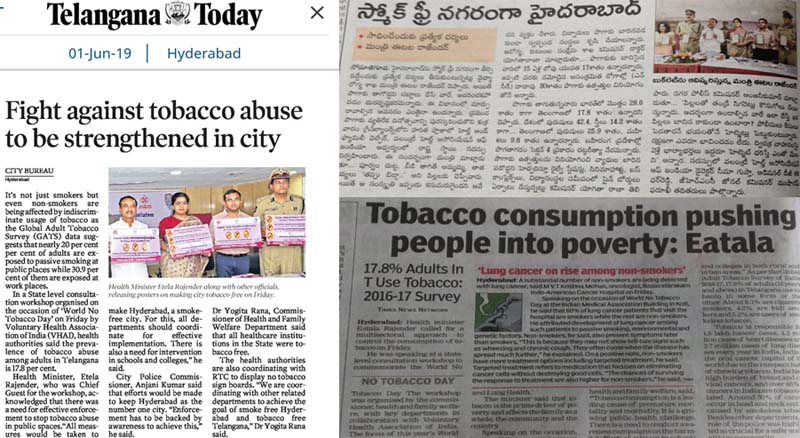
The Union Health Ministry banned the sale of e-cigarettes in India. In an advisory to all the states and union territories, it has asked them to see to it that their sale is stopped.
Since health is a state subject, the Union ministry had to issue an advisory. “The States/Union Territories are advised, in larger public health interest and in order to prevent the initiation of ENDS by non-smokers and youth with special attention to vulnerable groups, to ensure that any Electronic Nicotine Delivery Systems (ENDS) including e-Cigarettes, Heat-Not-Burn devices, Vape, e-Sheesha, e-Nicotine Flavoured Hookah, and the like devices that enable nicotine delivery are not sold (including online sale), manufactured, distributed, traded, imported and advertised in their jurisdiction,” the advisory read.
Citing health concerns, the ministry said that the ENDS are particularly harmful for children, adolescents, pregnant women and women of reproductive age. In a detailed advisory, the ministry said that ENDS aerosol contains nicotine, the addictive component of tobacco products. “In addition to creating dependence, nicotine can have adverse effects on the development of the foetus during pregnancy. It may contribute to cardiovascular disease to the people who use ENDS. Also, nicotine may function as a “tumour promoter” and seems to be involved in the biology of malignant diseases,” the advisory adds.
A number of metals, including lead, chromium, and nickel, and chemicals like formaldehyde have been found in aerosols of some ENDS, with concentrations equal to or greater than traditional cigarettes, under normal experimental conditions of use, according to the advisory.
The ministry’s advisory came a week after Delhi High Court ordered it to take regulatory measures to control the sale of e-cigarettes. “Let an affidavit be filed within a week indicating by what time regulatory measures would be brought into place and enforce it in letter and spirit. In case we are not satisfied with the response given by the Secretary, we may consider to take coercive action against the Department,” read the order passed by bench of Chief Justice Rajendra Menon and Justice V Kameshwar Rao on August 21, 2018.
According to globaldata.com, India’s e-cigarette market was poised to grow at a compound annual growth rate of 34 per cent from Rs 4.1 billion in 2017 to Rs 7.4 billion in 2019.
Tobacco products would continue to carry pictorial warning covering 85 per cent of the packaging space, the Supreme Court said.
The apex court, on January 8, had stayed the Karnataka High Court order quashing the 2014 government regulation that packets of tobacco products must carry pictorial warning covering 85 per cent of the packaging space. A bench comprising Chief Justice Dipak Misra and Justice A M Khanwilkar today made “absolute” its earlier interim order by which it had stayed the High Court order.
“Keeping in view the objects and reasons of the Cigarettes and Other Tobacco Products (Prohibition of Advertisement and Regulation of Trade and Commerce, Production, Supply and Distribution) Act, 2003 and the measures taken by the state, we think it appropriate to direct stay of operation of the judgement and order passed by the High Court of Karnataka,” it had said.
Earlier, the bench had said that it was unimpressed with the submissions of the Tobacco Institute of India (TII) that the interim stay would harm the fundamental right to do business of tobacco manufacturers.
Attorney General K K Venugopal, appearing for the Centre, had said that the high court judgement needed to be stayed and 85 per cent pictorial warning on packaging space of tobacco products be allowed to remain as a large section of the population is not educated. Life sans health is not worth living and chewing of tobacco or smoking of cigarettes or bidis, causes irretrievable hazard to health, he had said. It is the obligation of the state to make the people aware of the injurious nature of these indulgences, Venugopal had said. The high court, on December 15, last year had struck down the 2014 amendment rules that mandated pictorial health warnings to cover 85 per cent of packaging space of tobacco products, holding that they were unconstitutional as they violated fundamental rights like the right to equality and the right to trade.
The Cigarettes and Other Tobacco Products (Packaging and Labelling) Amendment Rules, 2014 (COTPA) had come into effect from April 1, 2016.
The high court had, however, made it clear that the 40 per cent pictorial health warning rule, which existed prior to the amendment rules, would remain in force.
In May last year, the Supreme Court had transferred all petitions against the 85 per cent rule filed in various high courts to the Karnataka High Court and asked it to hear and dispose them of.
The Ministry of Health and Family Welfare has notified a new set of specified health warnings for all tobacco products — manufactured or imported or packaged on or after September 1 — to be displayed on the packets.
The images, details of the specified health warnings and the rules are available at www.mohfw.gov.in.
Punishable offence
“Any person engaged directly or indirectly in the production, supply, import or distribution of cigarettes or any tobacco products shall ensure that all tobacco product packages shall have the specified health warnings exactly as prescribed. Violation of the above mentioned provision is a punishable offence with imprisonment or fine as prescribed in Section 20 of the Cigarettes and Other Tobacco Products [Prohibition of Advertisement and Regulation of Trade and Commerce, Production, Supply and Distribution] Act, 2003,” noted a release issued by the Ministry.
The new set of specified health warning for all tobacco product packs has been brought in by making an amendment in the Cigarettes and other Tobacco Products (Packaging and Labelling) Rules, 2008 vide GSR 331(E) dated April 3, 2018, “Cigarettes and other Tobacco Products [Packaging and Labelling] Second Amendment Rules, 2018”.
The amended rules will be applicable with effect from September 1, 2018.
A person can be prosecuted for an act or omission constituting an offence under two different laws but cannot be sentenced twice for the same offence, the Supreme Court has said.
The court said Maharashtra Police can initiate criminal action under IPC for transportation, stocking and sale of ‘Gutka’ or Pan Masala, which are offences also punishable under the Food and Safety Standards (FSS) Act.
“Where an act or an omission constitutes an offence under two enactments, the offender may be prosecuted and punished under either or both enactments but shall not be liable to be punished twice for the same offence,” a bench of Justices S A Bobde and L Nageswara Rao said.
The bench was hearing an appeal of the Maharashtra government challenging the Bombay High Court order which had said that a person can be held liable for offences of transportation, stocking and sale of Gutka or Pan Masala under the FSS Act and not the Indian Penal Code (IPC).
“A perusal of the provisions of the FSS Act would make it clear that there is no bar for prosecution under the IPC merely because the provisions in the FSS Act prescribe penalties. We, therefore, set aside the finding of the High Court on the first point,” the bench said on Thursday.
It said there was no dispute that section 55 of the FSS Act provides only for penalty to be imposed for non-compliance of the requirements of the Act, Rules or Regulations or orders issued by the Food Safety Officer.
“There is no bar to a trial or conviction of an offender under two different enactments, but the bar is only to the punishment of the offender twice for the offence,” the top court said.
The court said that it does not agree with the conclusion of the High Court that non-compliance of the provisions of the Act, Rules or Regulations or orders cannot be subject matter of a prosecution under IPC unless expressly or impliedly barred.
The top court said that the High Court committed an error while interpreting the scope of section 188 of the IPC which relates to disobedience to order duly promulgated by public servant.
“Section 188 of the IPC does not only cover breach of law and order, the disobedience of which is punishable. Section 188 is attracted even in cases where the act complained of causes or tends to cause danger to human life, health or safety as well,” the court said. The bench added that it cannot agree with the findings of the high court that the prohibitory order of the Commissioner, Food and Safety is not an order contemplated under the IPC and the provisions of the FSS Act can only be resorted for non-compliance of orders passed under the FSS Act as it is a special enactment.
“An act or an omission can amount to and constitute an offence under the IPC and at the same time, an offence under any other law. The High Court ought to have taken note of Section 26 of the General Clauses Act, 1897…,” it said.
The top court remanded back the matter to the high court for adjudicating the point whether the offences under IPC are made out against the alleged offenders of the rule.
It, however, said that till the adjudication of petitions of stockists of Gutka and Pan Masala, no coercive action should be initiated. The case pertains to FIR registered in Maharashtra for transportation, sale and stocking of Pan Masala, Gutka in contravention to the provisions of the FSS Act. The stockists moved the high court seeking quashing of FIR on the ground that action can only be initiated against them under the FSS Act and not IPC.
The high court quashed the criminal proceedings against them and declared that the Food Safety Officers can proceed against the stockists and sellers of Gutka and Pan Masala under the provisions of the FSS Act only.

